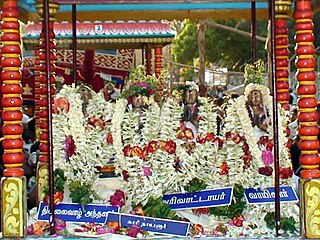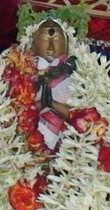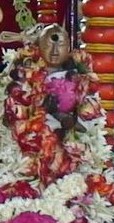Related Research Articles
Kotpuli, also known as Kotpuliyar and Kotpuli Nayanar, was a Nayanar saint, venerated in the Hindu sect of Shaivism. He is generally counted as the fifty-seventh in the list of 63 Nayanars.
Muruga Nayanar or Muruka Nayanar is the 15th Nayanar saint. Traditional hagiographies like Periya Puranam and Thiruthondar Thogai describe him as a great devotee of the Hindu god Shiva. He is described to have lived an ascetic life, filled with austerity and selfless devotion to Shiva, spending his time in collecting flowers from woodlands and decorating the Shiva Lingam with garlands and coronets.
Kanampulla Nayanar is the 46th Nayanar saint. Traditional hagiographies such as the Periya Puranam and Thiruthondar Thogai describe him as a great devotee of the Hindu god Shiva.
Rudra Pasupathi Nayanar is the 16th Nayanar saint. Traditional hagiographies like Periya Puranam and Thiruthondar Thogai detail his legendary life and services to the Hindu god Shiva. Pasupathi Nayanar was a learned Brahmin devotee who practised chanting of the Shri Rudram Chamakam, a Vedic hymn dedicated to Rudra. Therefore, he is known by the name Rudra Pasupathi Nayanar.

Narasinga Muniyaraiyar Nayanar is the 40th Nayanar saint. Traditional hagiographies like Periya Puranam and Thiruthondar Thogai detail his legendary life and services to the Hindu god Shiva.Narasinga Muniyaraiyar Nayanar was the chieftain of the state Tiru Munaipadi.Muniyaraiyar The saint was a contemporary of Sundarar.

Kari Nayanar is the 47th Nayanar saint. Traditional hagiographies like Periya Puranam and Thiruthondar Thogai detail his legendary life and services to the Hindu god Shiva. Kari Nayanar was a vedic Brahmin devotee as well as a Tamil poet with an understanding of Sanskrit. The poet-saint compiled the vedic truths in Kovai(Anthology), a Tamil composition titled Karikkovai. This book is now considered lost. Therefore the saint got the name as Kari Nayanar.

Apputhi Adigal, also spelt as Apputhi Adikal, Atputhi Adigal, Apputi Adigal, Appoodi Adikal, Appoothi Adikal and Appudhi Adigal and known as Appuddi Nayanar, was a Nayanar saint, venerated in the Hindu sect of Shaivism. He is generally counted as the twenty-fifth in the list of 63 Nayanars. He is described as a contemporary of Appar or Thirunavukkarasar, one of the most prominent Nayanars.
Somasi Mara Nayanar, also known as Somasi Maranar, Somasi Marar, Somasimarar and Somasira Nayanar, is a Nayanar saint, venerated in the Hindu sect of Shaivism. He is generally counted as the thirty-third in the list of 63 Nayanars. He is also called Marar, Maran and Mara Nayanar, names he shares with Ilayankudi Mara Nayanar. The two Nayanars are generally differentiated by the prefixes "Somasi" and "Ilayankudi". He was a contemporary and devotee of Sundarar.

Isaignaniyar, also spelt as Isainaniyar, Isaignaniyaar, Isaignaniar and Isaijnaniyar and also known as Isai-jnani Ammaiyar, is the mother of Sundarar, one of the known Nayanar saints. She is regarded as a Nayanar saint, venerated in the Hindu sect of Shaivism, along with her husband Sadaiya Nayanar. She is counted as the last in the list of 63 Nayanars.

Sadaiya Nayanar or Sadaiyar is a 7th century Nayanar saint in the Hindu sect of Shaivism, venerated for being father of the prominent saint Sundarar rather than for individual merit. He and his wife Isaignaniyar are generally counted as sixty-second and sixty-third on the list of the sixty-three Nayanar saints. Sundarar is the only Nayanar with both parents venerated.
Viralminda Nayanar, also known as Viranmindar (Viranmintar), Viranmintan and Viranminda Nayanar, is a Nayanar saint, venerated in the Hindu sect of Shaivism. He is generally counted as the sixth in the list of 63 Nayanars. He was a contemporary of Sundarar. He along with Cheraman Perumal Nayanar are the two Nayanars from Kerala. Viralminda Nayanar is described in legends as the reason Sundarar composed a hymn to the Nayanar saints, which became the first compilation of the list.
Sirappuli Nayanar, also known as Sirappuli, Sirapuli Nayanar, Sirappuliyar (Chirappuliyar), was a Nayanar saint, venerated in the Hindu sect of Shaivism. He is generally counted as the thirty-fifth in the list of 63 Nayanars. Sirappuli Nayanar is described to have served the devotees of the god Shiva and worshipped the god with various ritual practices.
Seruthunai Nayanar, also known as Seruthunai, Seruthunaiyar and Seruttunai Nayanar, was a Nayanar saint, venerated in the Hindu sect of Shaivism. He is generally counted as the 55th in the list of 63 Nayanars.
Nesa Nayanar, also known as Sivanesa Nayanar, Neca Nayanar, Nesanar, Nesar and Nesan (Necan), was a Nayanar saint, venerated in the Hindu sect of Shaivism. He is generally counted as the fifty-ninth in the list of 63 Nayanars. Nesa Nayanar is described to be a weaver, who was always engrossed in remembering his patron god Shiva and gifting clothes he knit to devotees of the deity.

Pugazh Thunai Nayanar, also known as Pugazhthunai Nayanar, Pugalthunai Nayanar, Pukazhtthunai Nayanar, Pukazhtthunaiyar and Pukalttunai, was a Nayanar saint, venerated in the Hindu sect of Shaivism. He is generally counted as the fifty-sixth in the list of 63 Nayanars.
Kutruva Nayanar, also known as Kootruva , Kutruva, Kutruvar, Kootruvar, Kurruva Nayanar, Kurruvar, Kurruvan, Kutruvanar, Kurrrruvar and Kalappalar, was a chieftain of Kalandai and a Nayanar saint, venerated in the Hindu sect of Shaivism. He is generally counted as the 39th in the list of 63 Nayanars. Kutruva is often described as a Jain, who became a devotee of Shiva, the patron god of Shaivism.
Kalarsinga Nayanar, also known as Kalarsinga, Kazharsinga, Kalarcinkan, Kalarsingan, Kalarsinganar, Kalarsingar, Kalarcingar and Kalar-chingar (Kalar-singar), was a Nayanar saint, venerated in the Hindu sect of Shaivism. He is generally counted as the fifty-fifth in the list of 63 Nayanars. While his identity remains a matter of debate, many scholars identity Kalarsinga Nayanar as the Pallava king Narasimhavarman II (Rajasimha), who reigned between 700 and 728 CE.
Munaiyaduvar, also known as Manai Aduvar Nayanar, Munaiyaduvar Nayanar, Munayaduvar, Munayaduvaar, Munaiyaduvaar and Munaiyatuvar, was a Nayanar saint, venerated in the Hindu sect of Shaivism. He is generally counted as the 52nd in the list of 63 Nayanars. Munaiyaduvar is described as a mercenary soldier, who would fight for the weak and vanished and use the fees received in service of his patron deity Shiva and the god's devotees.
Ilayankudi Maranar, also known Ilaiyangudi Nayanar, Ilaiyankuti Nayanar, Ilayangudi Mara Nayanar, is a Nayanar saint, venerated in the Hindu sect of Shaivism. He is generally counted as the fourth in the list of 63 Nayanars. He is also called Marar, Maran and Mara Nayanar, names he shares with Somasi Mara Nayanar. The two Nayanars are generally differentiated by the prefixes "Ilayankudi" and "Somasi".
Iyarpagai Nayanar, also known as Iyarpagaiar, Iyarpahai Nayanar, Iyarpagaiya Nayanar and Iyarppakai Nayanar is a Nayanar saint, venerated in the Hindu sect of Shaivism. He is generally counted as the third in the list of 63 Nayanars.
References
- ↑ "Sri Mahalakshmi temple". Dinamalar. Retrieved 4 May 2012.
- ↑ The history of Perumizhalaik Kurumba nAyanAr
- ↑ Sivananda, Swami (1999). "23. Perumizhalai Kurumba Nayanar". Sixty-three Nayanar Saints (4 ed.). Shivanandanagar: The Divine Life Society. Retrieved 4 May 2012.